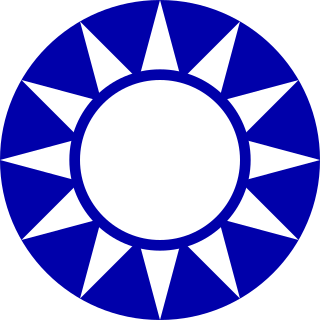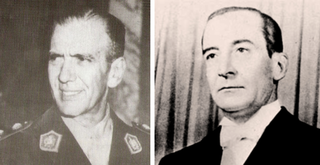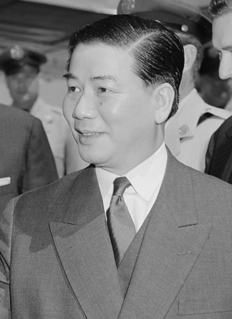 W
WThe Battle of Yijiangshan Islands was a conflict between forces of the National Revolutionary Army (NRA) of the Republic of China and the People's Liberation Army (PLA) of the People's Republic of China, over one of the last strongholds of Nationalist (ROC) forces near mainland China on the Yijiangshan Islands. The conflict occurred from January 18 to January 20, 1955 during the First Taiwan Strait Crisis, and resulted in a PLA victory and the complete destruction of the ROC garrison.
 W
WThe First Taiwan Strait Crisis was a brief armed conflict between the Communist People's Republic of China (PRC) and the Nationalist Republic of China (ROC) in Taiwan. The Taiwan strait crisis began when the PRC seized the Yijiangshan Islands and forced the ROC to abandon the Tachen Islands, which were evacuated by the navies of the ROC and the US.
 W
WThe Kuomintang Islamic insurgency refers to a continuation of the Chinese Civil War by Chinese Muslim nationalist Kuomintang Republic of China Army forces in Northwest China, in the provinces of Gansu, Qinghai, Ningxia, and Xinjiang, and another insurgency in Yunnan.
 W
WThe Montgomery bus boycott was a political and a social protest campaign against the policy of racial segregation on the public transit system of Montgomery, Alabama. It was a seminal event in the civil rights movement in the United States. The campaign lasted from December 5, 1955—the Monday after Rosa Parks, an African-American woman, was arrested for refusing to surrender her seat to a white person—to December 20, 1956, when the federal ruling Browder v. Gayle took effect, and led to a United States Supreme Court decision that declared the Alabama and Montgomery laws that segregated buses were unconstitutional.
 W
WOperation Black Arrow was an Israeli military operation carried out in Gaza on 28 February 1955. The operation targeted the Egyptian Army. Thirty-eight Egyptian soldiers were killed during the operation as were eight Israelis.
 W
WOperation Elkayam also known as the Khan Yunis raid, was an Israeli military operation that targeted Egyptian military positions in the Khan Yunis area. The successful operation resulted in the destruction of Egyptian military installations as well as the deaths of seventy-two Egyptian soldiers. There was one Israeli fatality.
 W
WOperation Volcano, also known as Operation Sabcha, was a large-scale Israel Defense Forces (IDF) military operation carried out on the night of November 2–3, 1955 against Egyptian military positions in and around the Nitzana/Auja vicinity. The operation was successful and resulted in the permanent expulsion of Egyptian forces from the Demilitarized Zone. Eighty-one Egyptian soldiers were killed and fifty-five others were taken prisoner. There were five Israeli fatalities.
 W
WThe Bombing of Plaza de Mayo was a massacre which took place in Buenos Aires, Argentina, on 16 June 1955. On that day, 30 aircraft from the Argentine Navy and Air Force strafed and bombed Plaza de Mayo square in Buenos Aires, in what remains to this day the largest aerial bombing ever on the Argentine mainland. The attack targeted the adjacent Casa Rosada, the official seat of government, as a large crowd was expressing support for president Juan Perón. The strike took place during a day of official public demonstrations to condemn the burning of a national flag allegedly carried out by detractors of Perón during the recent procession of Corpus Christi. The action was to be the first step in an eventually aborted coup d'état. The number of identified bodies was put at 308, including six children; an unknown number of victims could not be identified.
 W
WRevolución Libertadora is the coup d'état that ended the second presidential term of Juan Perón in Argentina, on 16 September 1955.
 W
WIn 1955, the Prime Minister of South Vietnam Ngô Đình Diệm faced a severe challenge to his rule over South Vietnam from the Bình Xuyên criminal gang and the Cao Đài and Hòa Hảo religious sects. In the Battle of Saigon in April, Diệm's army eliminated the Bình Xuyên as a rival and soon also reduced the power of the sects. The United States, which had been wavering in its support of Diệm before the battle, strongly supported him afterwards. Diệm declined to enter into talks with North Vietnam concerning an election in 1956 to unify the country. Diệm called a national election in October and easily defeated Head of State Bảo Đại, thus becoming President of South Vietnam.